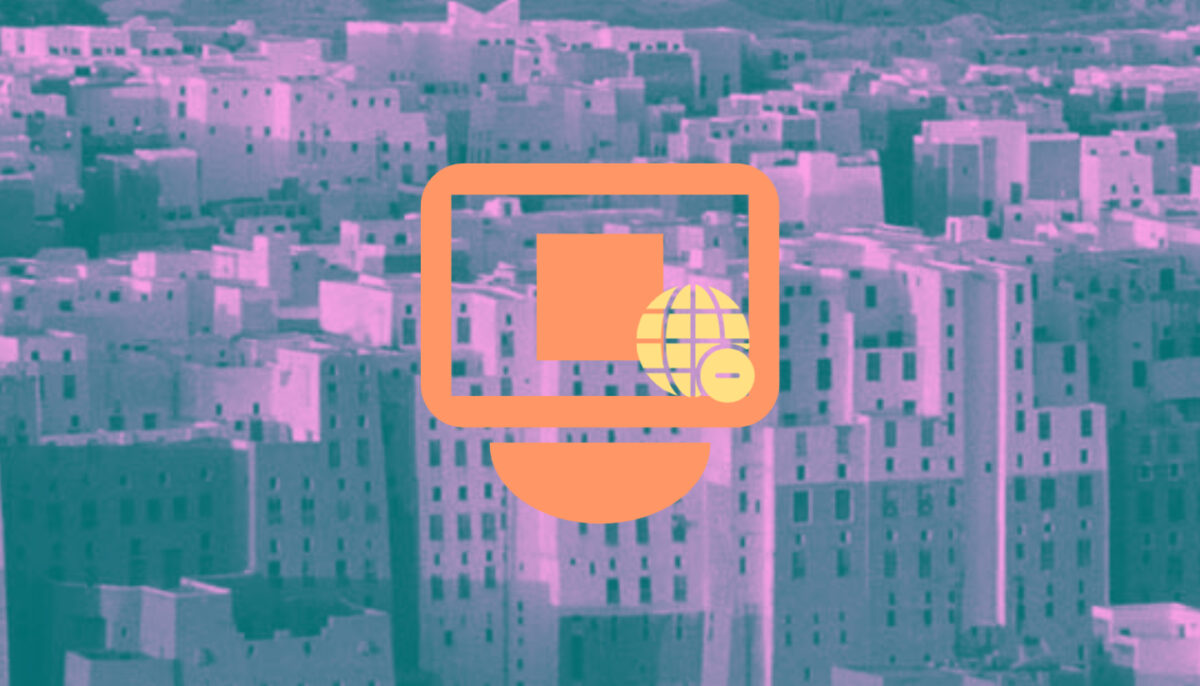As the war in Yemen rages on, and while the country is witnessing the world’s worst humanitarian crisis according to the United Nations, citizens no longer have a space to breathe, not even on social media. The conflicting parties have exploited internet services to promote their narratives, block opposing websites and impose an unprecedented censorship on content published online. Many believe that this undermines their right to freely express their opinions, as well as citizens’ right to access information and news.
Authorities have not only blocked news and opposition websites, but also enterntainment websites publishing content such as pornography, art, music and even social media platforms. The latter had served as an escape for millions of Yemenis coping with war and as a channel to manage their online businesses. These practices began in April of last year, according to users who spoke with SMEX.
In late 2019, Yemen.Net, a government-owned telecommunications company controlled by the Houthis, blocked Instagram without any justification. Telegram, WhatsApp, Facebook Messenger, imo and many other apps were also blocked intermittently since 2017.
“The party responsible for the recurrent blocking of websites by the company is the security and intelligence apparatus affiliated with the Houthis,” according to a source at Yemen.Net who preferred to remain anonymous. “Blocking operations mainly target news websites opposed to the authorities in Sanaa and applications believed to be unethical and socially corruptive,” the source added.
The situation is not much different in other regions controlled by Abdrabbuh Mansur Hadi’s government, as these regions still rely on the internet service provided by the Sanaa government, Yemen.Net, with the exception of certain neighborhoods and areas in Aden controlled by the Saudi-led coalition. Aden and some surrounding regions are now serviced by AdenNet, which began its operations at the end of 2018.
Illegal Blocking
Yemen has experienced the greatest number of internet shutdowns in the region, according to a 2019 report by AccessNow. “The only radical solution to internet blocking is having authorities refrain from stifling dissent and commit to ensuring each person’s right to access and use the internet,” says Fahmi Al Baheth, a digital rights activist and the former president of Internet Society’s Yemen Chapter.
“The blocking of websites in Yemen is illegal and unconstitutional,” attorney Ziad Al Daba’i told SMEX, adding that the Yemeni Constitution requires a court order to intercept any means of communication by any authority, “which is not currently the case.” Article 42 of the Yemeni Constitution stipulates that: “Every citizen has the right to participate in the political, economic, social and cultural life of the country. The state shall guarantee freedom of thought and expression of opinion in speech, writing, and photography within the limits of the law.” Article 53 of the Constitution guarantees “the freedom and confidentiality of mail, telephone, telegram and all other means of communication, none of which may be censored, searched, exposed, delayed or confiscated except in cases specified by law and according to a court order.”
Al Daba’i stresses the need to make the internet accessible to all citizens, particularly journalists and those working in civil society organizations, in accordance with the provisions of the Constitution, which states that the Consultative Council shall protect journalists and civil society organizations. He also emphasizes the “need to issue a special law regulating the internet and the digital domain in general,” adding that “any citizen directly affected by internet blocking may file a lawsuit before the administrative court.”
However, in countries suffering from war and political instability such as Yemen, Al Baheth says that “authorities violate the constitution and the law by resorting to internet blocking and shutdowns as a means to pressure other parties.” He adds that “authorities could also have other motives, as they fear people using the internet to issue invitations to political activities opposed to their rule, especially since the internet has proven to play an effective role in disseminating the truth and organizing joint activities.”
Small Enterprises Pay a Huge Price
Faten Fouad had to resort to using WhatsApp to promote her small business instead of Instagram, which had a large number of followers. “It all ended when the app was blocked. My business suffered a major blow, and WhatsApp marketing is limited to my contact list only,” Fouad said.
Marwa Al Oraiqi, a Yemeni journalist who covers stories in Yemen for foreign media outlets, told SMEX that “blocking this massive number of websites obstructs [journalists’] work and prevents [them] from collecting information online. Reports that usually take a few hours now need days to be completed, causing delays in delivery and sometimes leading to [their] dismissal by employers abroad.”
As a temporary solution, Marwa is asking colleagues based outside Yemen to provide her with the information she can’t access in the country. “This situation is very embarrassing as well as unsustainable. My friends have their own workload and cannot waste their time sending me links and sources,” she says.
The Search for Alternatives
Blocking websites affects internet users differently according to each person’s interests and needs, as Al Baheth told SMEX. For example, “it could obstruct the work of large companies, particularly digital companies using cloud services. As for individuals, blocking denies them the ability to communicate, access, and share information,” added Al Baheth.
To overcome blocking, Faten, like many other Yemenis, relies on VPN services. However, these services are not very widespread, either because citizens are not aware of them or because they increase internet data consumption and cost for those connecting to the internet via their mobile phones, according to Al Baheth.
“If you decide to use a VPN service, make sure to verify it, as not all VPN services are safe. Some do more harm than good, particularly in terms of collecting data to be sold later on,” Al Baheth explains. Therefore, people are advised to use safe and trusted software, such as Psiphon and ProtonVPN.



